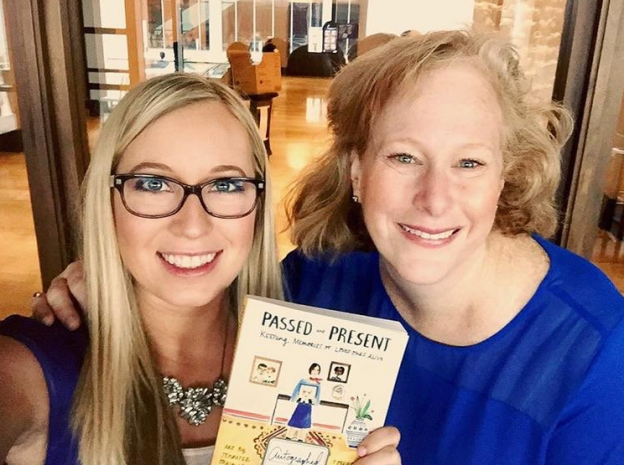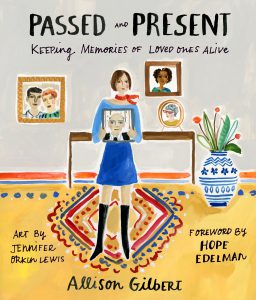Opening The Door To The Passed: Exclusive ICCFA Interview with Allison Gilbert
April 12th, 2017Last week, the funeralOne team was down in Nashville, Tennessee for the annual International Cemetery, Cremation and Funeral Association (ICCFA) conference!
Not only is ICCFA one of our favorite events of the year because we get to meet with amazing funeral professionals from all over the world, but it also brings together some of the brightest and most innovative funeral minds together under one roof to talk about the future of funerals. And to make sure you, at home, get in on the insights, we’re recapping some of our favorite conversations here on our funeralOne blog… enjoy!

Here at funeralOne, we are all about putting life celebration back into the center focus of funeral service.
Whether it’s through a more personalized funeral service, a more celebratory sympathy gift, or even a more meaningful tribute video that promotes healing for families, everything that we do encourages families and funeral directors to be proactive when it comes to life celebration and remembrance.
So it should come as no surprise that we found a kindred spirit in Allison Gilbert.
We first stumbled across Allison’s work after she published her first book on the topic of grief and healing, Always Too Soon: Voices of Support for Those Who Have Lost Both Parents. Since then, she has become a sought-after expert on grief, and has since published two more books on the topic: Parentless Parents: How the Loss of Our Mothers and Fathers Impacts the Way We Raise Our Children (a follow-up to her previous book) and the newly released Passed and Present: Keeping Memories of Loved Ones Alive.
Throughout all of her work — especially the recent release of Passed and Present, a one-of-a-kind guide to keeping memories of loved ones alive — Allison has had an unwavering commitment to helping people honor their loved ones and bringing the often challenging task of life remembrance and celebration into everyday life.
So when we found out that Allison would be speaking at ICCFA 2017 in Nashville, we knew we had to sit down with her and pick her brain about her story, her book and her ongoing commitment to celebrating life. Here’s a recap of our exclusive one-on-one interview…

Photo Credit: Jennifer Orkin Lewis
funeralOne: You’ve written about a lot of topics in your career, including everything from cancer prevention to the September 11th attacks. How did you find your way into the funeral/grief support space?
Allison: It comes from a very personal place. I lost both of my parents relatively young. My father got to meet my oldest child, but he died when my son was 18-months-old. He never got to meet my daughter. My mother died before my dad, so she never got to meet either of my children. And so I felt this profound sense of loss. Over time, what I realized is how good it feels to celebrate what my parents still mean to me and keep their memory alive. Remembering isn’t just good for me, it also benefits my kids who never got to know their maternal grandparents.
funeralOne: You’ve mentioned before that you didn’t feel like you had much support when your parents passed away. How did you come up with ways to personally help yourself heal?
Allison: I benefited tremendously when my parents died from friends and family who attended their funerals, called me on the phone, and dropped everything to show my brother and me much-needed TLC and support. I also read a lot of grief books, but many were frustrating to me. Bereavement experts seemed to agree that remembering is key to healing, but they failed to layout strategies for how to remember. This was infuriating to me and really somewhat baffling. I wanted to know what to do with my parents’ belongings — their photos, clothing, jewelry, pots, pans, and table linens. The list seemed endless and I felt overwhelmed.
If remembering is so important to moving forward, then I think it’s necessary to provide individuals and families the tools. For example, language and word choice became really important to me. My kids are teenagers now, but when they were really young and even to this day, instead of talking about “my mom” and “my dad,” I always talk about “your grandmother” and “your grandfather.” I orient what I say around their relationship with their grandparents. I think this actually helps make my parents a little bit more real to them.
funeralOne: Do you remember what the most beneficial aspects of the funeral process were for you? What was helpful when you were going through this loss?
Allison: Yes, each time the funeral director made me feel as if my family was the only family he’d ever helped. Looking back, that’s a significant feat. But the thoughtful, measured approach is a kindnesses I’ve never forgotten.
After the funeral, what really helped me was coming to understand that the work of remembering is up to me. The key to healing after loss is shifting from passive mourning to active remembering. We all are, in various ways, proactive in every part of our lives: If we want to meet for coffee, we make a plan. We discuss possible locations. We set a date. The same type of energy goes into keeping memories of loved ones alive. It won’t happen without a plan. And it’s up to us in this funeral service professional space to help individuals and families make that plan so widows, widowers, parents, and siblings may thrive.
funeralOne: So in Passed and Present, there are 85 activities… Are these really 85 proactive steps towards keeping your loved one’s memory alive?
Allison: Yes! The book is fun and uplifting!! Each concept is called a Forget Me Not and they’re divided into five categories. So if you live on Facebook, or if you’re on your phone all the time, you can use technology to remember and celebrate your loved one. This is great for nearly everyone, especially millennials. The book also contains ideas for remembering any time of year — not just during the holidays. Passed and Present is about using all our senses — hearing, touch, smell, taste, and sight — any day of the year, to keep our loved ones close and part of our lives.
funeralOne: There are many people who don’t understand the power of reflection and looking back on memories, so they might not consider trying one of these activities. What kind of healing power can these activities bring those who are grieving?
Allison: It’s something I call The Reflection Effect. Nostalgia, the sentimental longing for the past, makes us feel happier, stronger, and drives our capacity for resilience. The more we engage with our memories the more connected we feel not just to the past but to family and friends in the present. Embracing nostalgia decreases feelings of loneliness and increases our self-esteem. It’s considered a social emotion like empathy. And this is why many ideas in Passed and Present are meant to build community out of loss. Grieving is often an isolating experience. Remembering doesn’t have to be.
funeralOne: You mention many of the activities in “Passed and Present” would be beneficial in a group or community setting. What would you say to friends and family members who might want to suggest these activities to a grieving loved one, but might be unsure about “disturbing the peace?”
Allison: I get it. We hesitate to bring loss up in conversation because we don’t want to make things worse. I don’t think this is ever what happens. That person doesn’t need you to remind them of their loss. It’s already with them. Show your support by telling them you’re still thinking about them, that you are here, that you understand. Your words validate their experience, and that’s so very critical to do.
funeralOne: How can funeral professionals use a tool like Passed and Present to better serve families?
Allison: If you are a front-line funeral professional or a professional who works in a cemetery, or if you’re involved in the death care world which transitions to aftercare, you are in the best position to help and support families beyond a point of loss.
A funeral home can be this incredible repository for grief information and delivering these resources in person and online is a great way to re-engage with the community. As a business, staying engaged is vital for branding, marketing, and PR. Your funeral home or cemetery should always be top of mind.
But how?
One of the best opportunities is this: Let your families know how important it is to remember their loved ones, and then provide the tools for them to do just that. There are many events — author talks, book signings, Memory Bashes, and balloon releases — that funeral directors and cemeteries can run to bring communities together. And when they come (or read out in the newspaper or watch it on TV) they’ll know it was you who provided them such a wonderful, uplifting, and empowering memorial opportunity.
 To learn more about Allison Gilbert, or to order a copy of her new book, Passed and Present: Keeping Memories of Loved Ones Alive, check out her website: AllisonGilbert.com
To learn more about Allison Gilbert, or to order a copy of her new book, Passed and Present: Keeping Memories of Loved Ones Alive, check out her website: AllisonGilbert.com
Also stay tuned for our exclusive Mother’s Day blog coming up later this month, filled with a number of celebratory, beautiful activities from Allison that will help your funeral home remember and celebrate the mothers in your community!
(Photo credit: Allison Gilbert/Passed and Present)


Leave a Reply